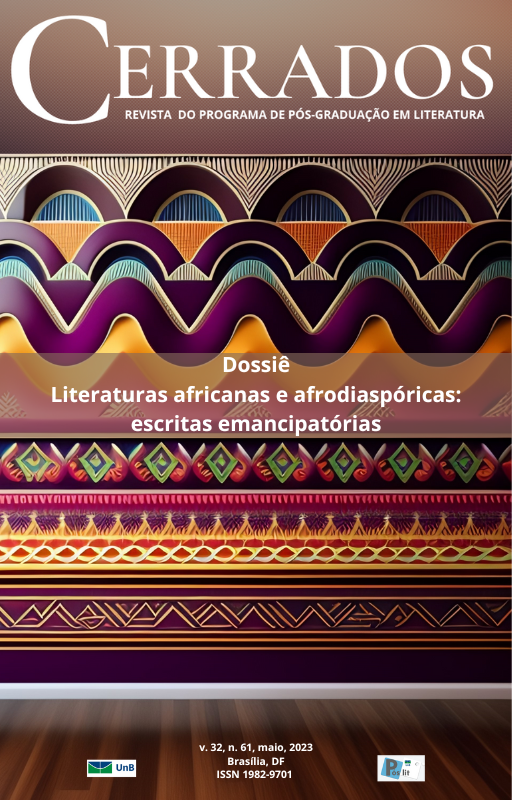Afropolitanism: Taiye Selasi’s emancipatory perspective in Ghana Must Go!
DOI:
https://doi.org/10.26512/cerrados.v32i61.45880Keywords:
Afropolitanism, Taiye Salesi, Ghana must go!.Abstract
The aim of this article is to briefly reflect on the conception of Afropolitanism as a result of an emancipatory perspective and its representation in the novel Ghana must go!, by Taiye Selasi. Coined by Selasi (2005) and first mentioned in the article “Bye-bye Babar (Or: What is an Afropolitan?)”, the term was later addressed by theorists sucha as Achille Mbembe, Wawrzinek and Makokha (2011), Simon Gikandi (2011) e Chielozona Eze (2014), among others. Departing from the concept of Afropolitanism and its theorization, the article analyzes the characters’ degree of adherence to the term.
Downloads
References
ARTHUR, J. A. African Diaspora Identities. Negotiating Culture in Transnational Migration. Lanham, Md.: Lexington Books, 2010.
BERRY, J. W. Migração, Aculturação e Adaptação. In: DEBIAGGI, S. D.; PAIVA, G. J. de (Orgs). Psicologia, E/Imigração e Cultura. São Paulo: Casa do Psicólogo, 2004, p. 29-45.
CARREIRA, S. S. G.. Formas de voltar para casa: uma análise da identidade diaspórica em Adeus, Gana!, de Taiye Selasi. Scripta Uniandrade, v. 20, n. 1, p. 55-73, 2022. Disponível em:
https://revista.uniandrade.br/index.php/ScriptaUniandrade/article/view/2216
Acesso em: 12 nov. 2022.
CASTLES, S.; HAAS, H.; MILLE, M. J.,The Age of Migration. International Population Movements in the Modern World Fifth Edition. Hampshire, New York: Palgrave Macmillan, 2014.
EZE, C. Rethinking African culture and identity: The Afropolitan model. Journal of African Cultural Studies, 26:2, p. 234-247, 2014. DOI: 10.1080/13696815.2014.894474. Acesso em: 05 out. 2022.
FAMILY MATTERS: How Novelist Taiye Selasi Came to Terms with Her Very Modern Family. London Evening Standard, 5 Apr. 2013. Disponível em: www.standard.co.uk/lifestyle/esmagazine/family-mattershow-novelist-taiye- selasi-came-to-terms-with-her-very-modern-family-8560426.html. Acesso em 17 Nov. 2022.
GIKANDI, S. Foreword: On Afropolitanism WAWRZINEK, J.; MAKOKHA, J.K.S. Negotiating Afropolitanism: Essays on Borders and Spaces in Contemporary African Literature and Folklore. Amsterdam, New York:: Rodopi, 2011. p. 9–11.
MBEMBE, A. African modes of self-writing. Identity, Culture and Politics, Volume 2, Number 1, p. 1-39, January 2001.
MBEMBE, A. Afropolitisme. Le Messager de Douala, Camarões, 20 dez. 2005.
MBEMBE, A. Afropolitanismo. Tradução de Cleber Daniel Lambert da Silva. Áskesis, v. 4, n. 2, p. 68 – 71, julho/dezembro, 2015. Disponível em:
https://www.revistaaskesis.ufscar.br/index.php/askesis/article/view/74 Acesso em: 18 abr. 2021.
PUCHEROVA, D. Afropolitan narratives and empathy: Migrant identities in Chimamanda Ngozi Adichie’s Americanah and Sefi Atta’s A bit of difference. Human Affairs, v. 28, p. 406–416, 2018. DOI: 10.1515/humaff-2018-0033. Acesso em: 03 out. 2022.
SELASI, T. Adeus Gana! São Paulo: Planeta, 2021.
SELASI, T. Bye-Bye, Babar. The LIP Magazine. Diversity and Multiculturalism. March 3, 2005. Disponível em: https://thelip.robertsharp. co.uk/2005/03/03/bye-bye-barbar/ Acesso em 18 ago. 2021.
STEINFELD, H. Afropolitan Space Invading between Neoliberalization and Africanization. 237 f. 2018. Tese de doutorado em Filosofia. Faculdade de Filosofia da Universidade Eberhard Karls de Tübingen, Alemanha, 2018.
UCHAM, E. U. An exploration of afropolitanism in Taiye Selasi's Ghana must go and chimamanda Adichie's Americanah. 141 f. Dissertação de Mestrado em Estudos Ingleses. Universidade de Namíbia, Namíbia, 2015.
WALLINGER, Hanna. Lost in transnation: Taiye Selasi’s Ghana must go! In: POCHMARA, Anna; LUCZAK, Ewa Barbara; DAYAL, Samir. New Cosmopolitanisms, Race, and Ethnicity: Cultural Perspectives. Berlin, Boston: 2019.
WAWRZINEK, J.; MAKOKHA, J.K.S. Negotiating Afropolitanism: Essays on Borders and Spaces in Contemporary African Literature and Folklore. Amsterdam, New York: Rodopi, 2011.
Downloads
Published
How to Cite
Issue
Section
License
Copyright (c) 2023 Revista Cerrados

This work is licensed under a Creative Commons Attribution 4.0 International License.
Proibida a reprodução parcial ou integral desta obra, por qualquer meio eletrônico, mecânico, inclusive por processo xerográfico, sem permissão expressa do editor (Lei n. 9.610 de 19/2/1998 )



